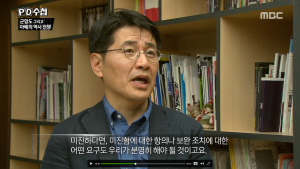‘남아수독오거서男兒須讀 五車書’ 남자는 모름지기 다섯 수레의 책을 읽어야 한다는 두보의 시에서 나온 구절이다. 원래는 장자가 친구 혜시의 장서를 두고 한 말이라고 한다. 이 말을 요즘식으로 해석해보면 ‘남아’는 장자 자신을 말한 것이니 꼭 ‘남자’라는 의미보다 그냥 ‘사람’이라고 보면 될 것 같고, 다섯 수레의 책이라 함은 당시 책이 죽간으로 되어 있었으므로 ‘다섯 수레’ 개념 보다는 그 시대 거의 모든 책의 양이었을 것이다. 그럼에도 오늘날의 양으로 꼭 환산해 본다면 대략 3천 권 정도의 책이 되지 않을까 한다. 따라서 남아수독오거서男兒須讀 五車書라는 말을 ‘사람이 태어나 죽기 전에 3천 권의 책은 읽어야 한다’ 쯤으로 해석해도 될 듯하다.
‘문사철 600’이라는 말도 있다. ‘문사철 600’은 문학 책 300권, 역사 책 200권, 철학 책 100권을 의미한다. 극작가이자 역사소설가인 신봉승 작가는 제대로 세상 살아가는 이치를 알기 위해서는 ‘문사철 600’을 30대에 마쳐야 하며 이것이 힘들다면 일생을 통해서라도 반드시 마쳐야 한다고 강조한다. 30대까지 다독을 통해 세상사는 이치를 깨우치고 있어야 함을 지적한 말이다.
우리나라 사람들이 독서를 하지 않는다는 뉴스는 사실 어제 오늘 일이 아니다. 2011년 자료에 따르면 한국인의 월평균 독서량은 1권이 안 되는 0.8권이라고 한다. 이는 미국 6.6권, 일본 6.1권, 중국 2.6권에 비해 우리나라 사람들의 얼마나 책을 읽지 않는지 말해주는 지표다. 월평균 독서량이 1권도 안 되는 0.8권이라는 숫자는 한류를 얘기하고 문화선진국을 꿈꾼다는 나라로서 부끄러운 숫자이다. 스마트폰의 등장이니, IT 발달에 의한 현상이니 하면서 독서하지 않는 이유를 대지만 변명치고는 궁색하다. 물론 통계의 기준을 어떻게 잡느냐에 따라 자료의 신빙성에 문제를 제기 할 수 있겠지만 우리나라 사람들이 다른 나라 사람들보다 책을 많이 읽지 않는 다는 것은 사실인 듯 하다. 전쟁으로 폐허가 된 국가에서 불과 60여 년 만에 경제대국으로의 놀라운 성장에 세계가 박수를 보내지만 책을 읽지 않는 나라의 미래는 밝지 않다.
직장인들의 평균독서량도 연 15권 정도라고 하니 월평균으로 따지면 1.25권으로 2권이 안 된다. 다른 OECD국가들에 비해 매우 낮은 수준이다. 앞에서도 얘기했듯이 제대로 된 교양을 갖춘 지식인이 되기 위해서는 두보가 ‘남아수독오거서’를 통해 강조했듯이 평생 3천 권의 책을 읽어야 읽어야 한다는 생각이다. 또한 ‘문사철 600’은 40대 이전에 마스터하고 만일 지금 40대인데도 넘지 못하였다면 향후 10년 안에 반드시 ‘문사철 600’을 마스터 해 볼 것을 권한다. 책을 많이 읽어 제대로 된 지식인이 많아 져야 사회의 수준이 올라가고 국가의 수준도 올라간다. 정치인들은 말로만 일류국가를 만들겠다고 하지 말고 독서량을 어떻게 늘릴 것인가의 대안을 내놓는 공약이 있어야 한다. 그런 의미에서 경기도 군포시청의 독서 전담부서인 ‘책 읽는 군포실’ 운영은 지방 자치단체에서 진행하는 우수한 사례라 할 수 있다. 자치단체장 한 사람의 진취적이고 창의적인 생각이 세상을 바꾼다.
독서의 힘은 흔히 모죽이라는 대나무에 비교하곤 한다. 우리나라와 중국, 일본 등지에서 자생하는 모죽이라는 대나무는 씨를 뿌리고 난 후 죽순이 나오는 것 말고는 5년 동안은 아무 변화가 없다고 한다. 5년째 되는 해 갑자기 자라기 시작하여 어떤 것은 하루 70센티씩 자라 거의 30미터까지 자란다. 그러니까 모죽은 5년 동안 자라지 않은 것이 아니라 5년 동안 땅속에서 넓게 뿌리를 뻗어 양분을 흡수하고 도약을 준비한 것이다. 독서를 하는 것도 이와 같다. 한 두 권 읽었다고 바로 성장하는 것이 아니라 눈에 보이지 않지만 모죽의 세월처럼 일정 정도 지식의 양이 찰 때까지 견뎌내야 하는 것이다. 그 모죽의 세월을 견디고 도약하는 시점이 바로 3천 권의 독서다. 마치 물이 99도까지는 끓지 않다가 임계점인 100도를 넘으면 끓어서 기체가 될 수 있듯이 독서를 통한 깨달음의 임계점도 분명히 존재한다고 생각한다. 그리고 그 선이 바로 3천 권이라고 생각한다.
http://postfiles6.naver.net/20160306_101/junbh1_1457196886655I9nMq_PNG/%B8%F0%C1%D7.png?type=w3
여기서 말한 3천 권의 기준은 그냥 한 말이 아니다. 실제 이런 기준으로 책을 통해 이치를 깨우치고 새로운 삶을 살게 되었다는 다독가들의 경험담에 기초한 것이다. 목사였던 민들레영토의 지승룡 소장은 이혼 후 나락에 떨어졌다. 그 때 그가 할 수 있는 일은 근처 도서관에서 온 종일 책 읽기였다. 그는 2년 동안 매일 도서관에서 무려 2천 권에 달하는 책을 읽었다. 그 후 포장마차를 시작해 종자돈을 벌어 민들레영토를 시작할 수 있었다. 『꿈꾸는 다락방』의 저자 이지성 작가는 2천권의 책을 읽고서야 뭔가 세상을 보는 시야가 트였다고 말한다. 일본 IT업계의 신화가 된 손정의 소프트뱅크 회장은 26살에 간염으로 3년 동안 입원하였다. 아무 것도 할 수 없어 읽기 시작한 책이 3년 동안 4천 권에 달했다고 한다. 그는 ‘그 3년 동안의 독서가 내 인생을 바꿨다’고 말한다.
http://postfiles12.naver.net/20160306_283/junbh1_1457196773538WeHh9_JPEG/%BB%E7%B6%F7.jpg?type=w3
▲책은 사람을 만든다.
교보문고 설립자 신창제 회장은 ‘사람은 책을 만들고 책은 사람을 만든다’고 하였다. 책은 사람을 만든다. 책은 사람의 삶을 바꾼다. 책은 세상의 이치를 깨우치게 해준다. 책은 인생의 방향을 알려준다. 미래가 불안한 그대여 책을 믿어라. 책을 읽어라. 독서가 불안한 미래에 답을 줄 것이며, 독서가 그대의 끝나지 않은 꿈의 길로 인도해 줄 것이다. 아무리 바쁘고 시간이 없다고 하여도 잠을 거르는 사람은 없다. 아무리 힘들고 어렵다고 말해도 식사를 거르는 사람은 없다. 독서를 잠을 자듯이 생각해 보자. 독서를 식사 하듯이 해야 한다.
남아수독오거서男兒須讀五車書, 3천 권의 책을 읽어야 한다는데, 그대는 지금까지 몇 권을 읽었는가? ‘문사철 600’ 30대에 마스터해야 한다는데, 그대는 지금 어디까지 도달하였는가? 지금 당장 근처 도서관이나 서점으로 달려가자. 3천 권이라는 숫자는 평생 이루기에도 결코 만만치 않은 숫자이다. 1년에 100권씩 10년을 읽어야 1천 권이다 나는 모든 사람이 3천 권을 읽었으면 좋겠지만 현실적인 것을 감안하여 누구나 50살이 되기 전에 ‘문사철 600’은 반드시 달성해야 한다고 생각한다. 600권이라는 책도 1년에 50권씩 12년을 읽어야 하는 숫자이다. 지금 당장 100권 읽기에 도전을 시작한다면 50살이 되기 전에 문사철 600은 달성할 수 있을 것이다. 일단 한 번쯤 1년 100권을 달성해보면 책 읽기에 눈이 트인다. 책 읽기에 눈이 트이게 되면 세상이 다르게 보이기 시작한다.
나는 근 20여 년을 자녀교육 컨설턴트로 살아왔다. 교육 현장에서 누구보다 독서의 중요성을 몸소 체험하였고, 독서를 통해 아이들이 얼마나 바뀌는지 지켜보았다. 나는 신이 인류에게 준 가장 보배로운 선물은 언어 문자라고 생각한다. 그 덕분에 인간은 만물의 영장이 될 수 있었다.
바로 책이 그 신의 선물이다.
출처: http://blog.naver.com/PostView.nhn?blogId=junbh1&logNo=220646783779

 연어나 홍어 같은 어류는 알을 낳기 위해서 상류로 올라간다.
연어나 홍어 같은 어류는 알을 낳기 위해서 상류로 올라간다.